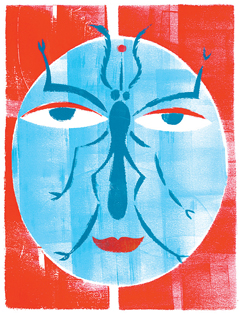
Some years ago, my first Buddhist teacher got permission for me to do a retreat in Korea that is usually attended only by monks. I was the only layperson there, an American at that, and we took a vow not to move while sitting. There was a great deal of ego involved. I felt as if I were sitting there holding the flag. The official American meditator of the Olympic games.
At the beginning of one morning sitting, after the first minute or so, I was bitten by a mosquito. This is a rather ordinary event, but it marked a major turning point in my practice. I am actually deeply grateful to that Korean mosquito. She was just doing her job, of course. She was being a mosquito. But the bite really started to itch. I didn’t think I could stand it. There I sat, with 58 minutes between me and the opportunity to scratch.
Right practice, of course, was just to feel the sensation. Forget about mosquitoes, the nature of insect bites, the word itch. Just feel exactly what the sensation is on your skin at that moment. The breath is very helpful in that regard. It helps you stay with the object; it nourishes your mindfulness; it cuts down on unnecessary thinking. You can also become absorbed in the breath to take your mind off the powerful urge to scratch.
It’s quite varied, this thing we call a mosquito bite: If you look closely, you see that the itch isn’t one feeling but a whole host of feelings, coming and going. It’s not solid; it’s a process. It grows more intense, then less so, disappears altogether for a few seconds, returns with a vengeance.
Sustained awareness perceives this truth; without awareness, it’s just a solid sheet of itch. Awareness also sees that the itch is impersonal. It comes from nowhere, goes to nowhere. You don’t own it, and it isn’t you. It’s a phenomenon of the natural world. You’re a part of that natural world. It begins to lose its power when you see what it really is.
But if you lose your mindfulness for even a second, all kinds of thoughts rush in: “Who made this rule about not moving, anyway? Who are they to tell me not to move? I hate this practice. I hate this country. I’m just going to go ahead and scratch. They’ll have to find a way to deal with it….”
Those thoughts kept rushing in for me—it was a difficult morning—and at some point I had a major realization. I was a highly educated man, had been a college professor; I’d read a great many books, even dharma books, but I was making this itch into one of the worst catastrophes in human history. Imagine what my mind would have done with a more serious problem!
If you go back to the original feeling, as I did when I was mindful, it still isn’t pleasant: nobody wants to itch. But you eliminate an enormous amount of suffering by concentrating on the suffering that is actually present instead of creating more with your thinking. It is the difference between discomfort and torment.